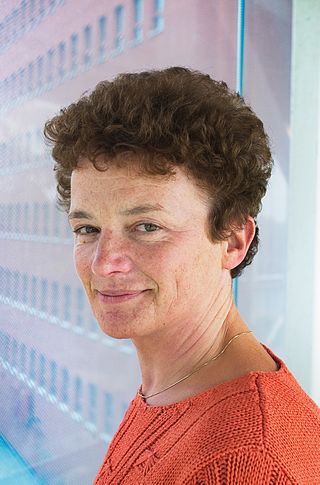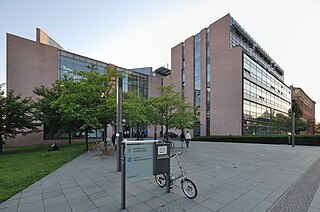Related Research Articles

Leiden University is a public research university in Leiden, Netherlands. It was founded as a Protestant university in 1575 by William, Prince of Orange, making it the oldest institution of higher education in the Netherlands.
In medicine, the hygiene hypothesis states that early childhood exposure to particular microorganisms protects against allergies by strengthening the immune system. In particular, a lack of such exposure is thought to lead to poor immune tolerance. The time period for exposure begins before birth and ends at school age.

Leiden University Medical Center or LUMC is the university hospital affiliated with Leiden University, of which it forms the medical faculty. It is located in Leiden, Netherlands. LUMC is a modern university medical center for research, education and patient care. Its research practice ranges from pure fundamental medical research to applied clinical research.

Polly Celine Eveline Matzinger is a French-born immunologist who proposed the danger model theory of how the immune system works.

Els Goulmy is an eminent professor of transplantation biology, especially regarding minor histocompatibility antigen, at Leiden University. Goulmy is an expert in the area of tissue typing and belongs internationally to the absolute top of her discipline. She was awarded the Spinoza Prize in 2002.

Helminthic therapy, an experimental type of immunotherapy, is the treatment of autoimmune diseases and immune disorders by means of deliberate infestation with a helminth or with the eggs of a helminth. Helminths are parasitic worms such as hookworms, whipworms, and threadworms that have evolved to live within a host organism on which they rely for nutrients. These worms are members of two phyla: nematodes, which are primarily used in human helminthic therapy, and flat worms (trematodes).
Immune dysregulation is any proposed or confirmed breakdown or maladaptive change in molecular control of immune system processes. For example, dysregulation is a component in the pathogenesis of autoimmune diseases and some cancers. Immune system dysfunction, as seen in IPEX syndrome leads to immune dysfunction, polyendocrinopathy, enteropathy, X-linked (IPEX). IPEX typically presents during the first few months of life with diabetes mellitus, intractable diarrhea, failure to thrive, eczema, and hemolytic anemia. unrestrained or unregulated immune response.

The Max Planck Institute for Infection Biology (MPIIB) is a non-university research institute of the Max Planck Society located in the heart of Berlin in Berlin-Mitte. It was founded in 1993. Arturo Zychlinsky is currently the Managing Director. The MPIIB is divided into nine research groups, two partner groups and two Emeritus Groups of the founding director Stefan H. E. Kaufmann and the director emeritus Thomas F. Meyer. The department "Regulation in Infection Biology" headed by 2020 Nobel laureate Emmanuelle Charpentier was hived off as an independent research center in May 2018. The Max Planck Unit for the Science of Pathogens is now administratively independent of the Max Planck Institute for Infection Biology. In October 2019, Igor Iatsenko and Matthieu Domenech de Cellès established their research groups at the institute, Mark Cronan started his position as research group leader in March 2020. Silvia Portugal joined the institute in June 2020 as Lise Meitner Group Leader. Two more research groups where added in 2020, Felix M. Key joined in September and Olivia Majer in October, completing the reorganization of the Max Planck Institute for Infection Biology. Simone Reber joined as Max Planck Fellow in 2023 and now heads the research group Quantitative Biology.
The effects of parasitic worms, or helminths, on the immune system is a recently emerging topic of study among immunologists and other biologists. Experiments have involved a wide range of parasites, diseases, and hosts. The effects on humans have been of special interest. The tendency of many parasitic worms to pacify the host's immune response allows them to mollify some diseases, while worsening others.

Akiko Iwasaki is a Sterling Professor of Immunobiology and Molecular, Cellular and Developmental Biology at Yale University. She is also a principal investigator at the Howard Hughes Medical Institute. Her research interests include innate immunity, autophagy, inflammasomes, sexually transmitted infections, herpes simplex virus, human papillomavirus, respiratory virus infections, influenza infection, T cell immunity, commensal bacteria, COVID-19 and Long COVID.

Andrea Ablasser is a German immunologist, who works as a full professor of Life Sciences at the École Polytechnique Fédérale de Lausanne. Her research has focused on how the innate immune system is able to recognise virus-infected cells and pathogens.

Sheena Margaret Cruickshank is a British immunologist and Professor in Biomedical Sciences and Public Engagement at the University of Manchester. She researches how immune responses of the gut are started as a result of infection and/or inflammation. Cruickshank is a science communicator.

Nina Papavasiliou is an immunologist and Helmholtz Professor in the Division of Immune Diversity at the German Cancer Research Center in Heidelberg, Germany. She is also an adjunct professor at the Rockefeller University, where she was previously associate professor and head of the Laboratory of Lymphocyte Biology. She is best known for her work in the fields of DNA and RNA editing.

Yasmine Belkaid is an Algerian immunologist and senior investigator at the National Institute of Allergy and Infectious Diseases (NIAID) and adjunct professor at the University of Pennsylvania. She is best known for her work studying host-microbe interactions in tissues and immune regulation to microbes. Belkaid currently serves as the director of the NIAID Microbiome program. On 29 March 2023, she was appointed as President of the Pasteur Institute for a six-year term, starting from January 2024.
Hazel Marguerite Dockrell is an Irish-born microbiologist and immunologist whose research has focused on immunity to the human mycobacterial diseases, leprosy and tuberculosis. She has spent most of her career at the London School of Hygiene and Tropical Medicine, where as of 2020 she is a professor of immunology. She was the first female president of the Royal Society of Tropical Medicine and Hygiene. Jimmy Whitworth of the Wellcome Trust describes her as "a marvellous ambassador for global health and research."

Mihai G. Netea is a Romanian Dutch physician and professor at Radboud University Nijmegen, specialized in infectious disease, immunology, and global health.
Sarah Rowland-Jones is a British physician who is a Professor of Immunology at the University of Oxford. She works on immune responses to HIV infection. She has focussed her research on problems caused by HIV in Africa, with a hope to create a successful HIV vaccine. She is the former president of the Royal Society of Tropical Medicine and Hygiene.
Karina Elizabeth de Visser, also named "Karin E. de Visser", is a researcher at the Netherlands Cancer Institute. Her research considers metastatic formation and how the immune system influences how people respond to cancer treatment.
Nynke Hester Dekker is a Dutch biophysicist who is Professor of Molecular Biophysics at the Kavli Institute of Nanoscience at Delft University of Technology. Dekker studies individual DNA and RNA molecules and how they interact with proteins in bacteria, viruses and eukaryotes. She described how virus proteins build errors into the virus RNA of viruses. In 2020, she was awarded the Spinoza Prize.
Annette Oxenius is a Swiss scientist who is a professor of immunology at ETH Zurich. Her research considers host-pathogen interactions and how the immune system responds to pathogenic infections. She was awarded the Cloëtta Prize in 2022 and elected member of the European Molecular Biology Organization in 2023.
References
- 1 2 "Maria Yazdanbakhsh". Leiden University. Retrieved 2023-07-07.
- ↑ "What can we learn from parasites? | Science and Cocktails". www.scienceandcocktails.org. Retrieved 2023-07-07.
- ↑ "Professor Maria Yazdanbakhsh | Hic Vac". www.hic-vac.org. Retrieved 2023-07-07.
- ↑ "Three new Leiden members of KNAW". Leiden University. 2020-04-30. Retrieved 2023-07-07.
- ↑ "Maria Yazdanbakhsh" (in Dutch). Royal Netherlands Academy of Arts and Sciences. Retrieved 2 December 2023.
- ↑ "Academy of Europe: CV". www.ae-info.org. Retrieved 2023-07-07.
- ↑ "Professor Maria Yazdanbakhsh | NWO". www.nwo.nl. Retrieved 2023-07-07.
- ↑ "Six researchers awarded the highest distinction in Dutch Science | NWO". www.nwo.nl. 2021-09-03. Retrieved 2023-07-07.
- ↑ "Spinoza prize | LUMC". www.lumc.nl. Retrieved 2023-07-07.
- ↑ "LUMC Professor Maria Yazdanbakhsh has been awarded an ERC Advanced Grant of 2.5 million euros – LUMC Global" . Retrieved 2023-07-07.
- ↑ "EMBO announces election of new members – Press releases – EMBO". 2023-07-04. Retrieved 2023-07-06.